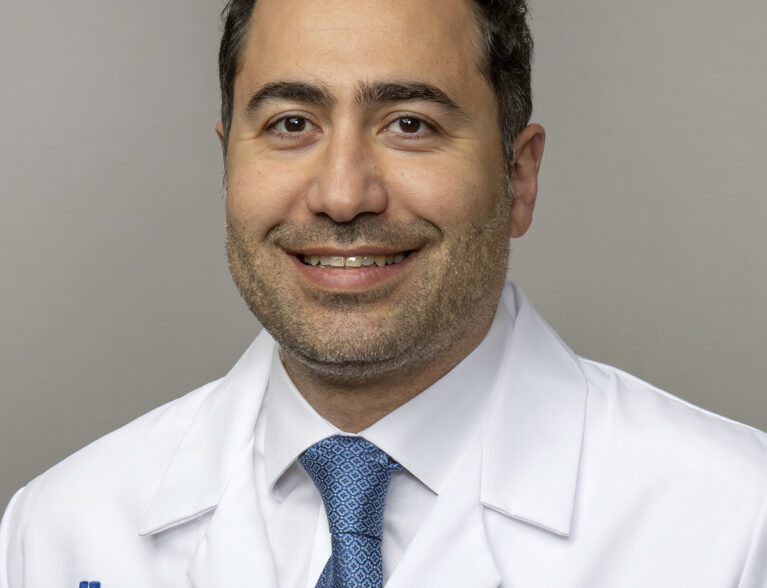
Each year more than half a million people go to emergency rooms seeking relief for pain caused by kidney stones, and the National Kidney Foundation estimates that 1 in 10 people will have a kidney stone at some time in their lives.
Osama Al-Alao, MD, a urologist at Tradition Hospital, explains that stones not only inflict intense pain, but cause permanent damage to the kidneys if left untreated.
Recently, Cleveland Clinic opened a new Stone Center for Excellence adjacent to Tradition Hospital in St. Lucie County which offers residents of the entire Treasure Coast state-of-the-art prevention and treatment options for kidney stones.
Exactly what are kidney stones? They’re solid masses or crystals that form from substances like minerals, acids and salts in your kidneys. They can be as small as a grain of sand or – rarely – larger than a golf ball.
“There’s a genetic factor involved for most patients,” Dr. Al-Alao says. “If at least one family member has suffered from them, your odds of developing kidney stones increase greatly.
“Other risk factors include age and dehydration – particularly in the southern states, where it’s hot and people often don’t drink enough water.”
Additionally, Cleveland Clinic says you may be at risk of kidney stones if you:
- Eat lots of meat and other protein-rich foods.
- Eat foods high in sodium or sugars (sucrose and fructose).
- Take vitamin C supplements.
- Have a blockage in your urinary tract.
- Have had stomach or intestine surgery, including gastric bypass surgery.
- Take certain medications, including some diuretics, calcium-based antacids, and antiseizure medications.
“Prevention is actually more important than treatment,” explains Dr. Al-Alao. “Once you’ve had one kidney stone, you have a significantly higher chance of having another one. We’re seeing an increase in the number of people developing stones, and diet choices and obesity are two of the main causes.”
The Stone Center for Excellence offers a full range of tests and can work up a unique risk-factor profile of each patient. Dr. Al-Alao explains that urologists, nephrologists and endocrinologists collaborate in formulating treatment plans.
The National Institutes of Health advises that effective management of kidney stones requires a multidisciplinary approach to address the complex interactions between diet, lifestyle and individual susceptibility.
Since one of the primary causes of kidney stones is unhealthy food choices, patients are educated about diet as part of their treatment.
“We help people learn what a balanced diet is and how to get started on the right path,” says Dr. Al-Alao. “That includes giving them recipes to take home with them.”
Cleveland Clinic says that if it seems like you have a kidney stone based on your symptoms and physical exam, you may need one or more of these tests:
- Urine test. A provider can test your pee for blood, stone-forming crystals and signs of infection.
- Imaging. X-rays, CT scans and ultrasound can help your healthcare provider see the size, shape, location and number of stones.
- Blood tests. A provider can use blood tests to check your kidney function, detect infections and look for high levels of calcium or other conditions that could lead to stone formation.
All these tests can be performed at the Stone Center for Excellence.
Dr. Al-Alao says that there are a multitude of treatments available if the patient doesn’t pass the kidney stone(s) naturally. About 90 percent of small kidney stones (smaller than 6mm) and 60 percent of large stones (larger than 6mm) pass on their own.
Robotic surgery can be used to help surgeons locate, break down and remove kidney stones. There are also treatments that employ lasers or shock waves to break up the stones with a minimum of discomfort.
Osama Al-Alao, MD, is a urologist at Cleveland Clinic Tradition Hospital. He specializes in kidney stone treatment and prevention. He completed fellowship training in advanced robotic and minimally invasive urologic surgery at Icahn School of Medicine at Mount Sinai, and minimally invasive urologic surgery at Brown University/Memorial Hospital in Rhode Island.
His offices are located in Tradition HealthPark Two, 10080 SW Innovation Way, Tradition. Call 877-463-2010 for an appointment. Video appointments are also available.



